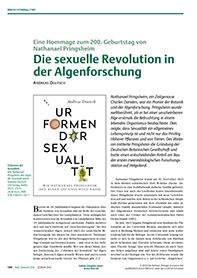Nathaniel Pringsheim and the sexual revolution in algae research: an homage to his 200th birthday
DOI:
https://doi.org/10.11576/biuz-7145Keywords:
Grünalgen, Coleochaeta, Urformen der Sexualität, Generationswechsel, Evolution der Landpflanzen, Deutsche Botanische Gesellschaft (DBG) e. V., Biologische Anstalt Helgoland (BAH)Abstract
Nathanael Pringsheim, born on November 30, 1823, began his scientific career with studies in philosophy and medicine before turning to experimental analytical botany, whose development was significantly shaped by him while assuming a pioneer role at the same time. His research on algae revolutionized the contemporary understanding of sexuality, which he recognized as a fundamental principle of life. Additionally, he identified a alternation of generations between sexual and asexual reproduction in algae, which promotes genetic diversity and adaptability. In the course of plant evolution, variations in this alternation of generations enable the colonization of new habitats. Pringsheim‘s work marks an exciting transition to modern natural science. On the one hand, he critically opposed speculative natural philosophy and metaphysics and was firmly rooted in modern biology and cell theory in his investigation of individual plant development. On the other hand, he adhered to an idealistic theory of evolution influenced by Goethe. He used his scientific influence and organizational skills to establish the German Botanical Society. Moreover, he was significantly involved in the establishment of the first German marine biological research station on Helgoland in 1892.


